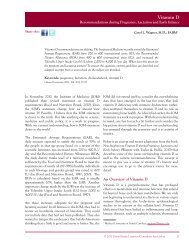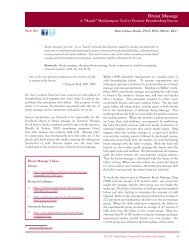Official Journal of the United States Lactation ... - Clinical Lactation
Official Journal of the United States Lactation ... - Clinical Lactation
Official Journal of the United States Lactation ... - Clinical Lactation
You also want an ePaper? Increase the reach of your titles
YUMPU automatically turns print PDFs into web optimized ePapers that Google loves.
studies <strong>of</strong> o<strong>the</strong>r parenting practices and child outcomes.<br />
The importance <strong>of</strong> caregiver responsiveness is common<br />
knowledge in developmental psychology. Lack <strong>of</strong> responsiveness,<br />
which “crying it out” represents, can result in<br />
<strong>the</strong> opposite <strong>of</strong> <strong>the</strong> aforementioned positive outcomes.<br />
The “cry it out” approach seems to have arisen as a solution<br />
to <strong>the</strong> dissolution <strong>of</strong> extended family life in <strong>the</strong> 20th<br />
century. The vast wisdom <strong>of</strong> grandmo<strong>the</strong>rs was lost in<br />
<strong>the</strong> distance between households with children, and<br />
those with <strong>the</strong> experience and expertise about how to<br />
raise <strong>the</strong>m well. The wisdom <strong>of</strong> keeping babies happy<br />
was lost between generations.<br />
But isn’t it normal for babies to cry<br />
No. A crying baby in our ancestral environment would<br />
have signaled predators to tasty morsels. So our evolved<br />
parenting practices alleviated baby distress and precluded<br />
crying except in emergencies. Babies are built to<br />
expect <strong>the</strong> equivalent <strong>of</strong> an “external womb” after birth<br />
(see Allan Schore, specific references below). What is <strong>the</strong><br />
external womb—being held constantly, breastfed on<br />
demand, needs met quickly (I have numerous posts on<br />
<strong>the</strong>se things). These practices are known to facilitate<br />
good brain and body development (discussed with references<br />
in o<strong>the</strong>r posts, some links below). When babies<br />
display discomfort, it signals that a need is not getting<br />
met, a need <strong>of</strong> <strong>the</strong>ir rapidly growing systems.<br />
What does extensive baby crying signal<br />
It shows <strong>the</strong> lack <strong>of</strong> experience, knowledge and/or support<br />
<strong>of</strong> <strong>the</strong> baby’s caregivers. To remedy a lack <strong>of</strong><br />
information in us all, below is a good set <strong>of</strong> articles about<br />
all <strong>the</strong> things that a baby’s cry can signal. We can all educate<br />
ourselves about what babies need and <strong>the</strong> practices<br />
that alleviate baby crying. We can help one ano<strong>the</strong>r to<br />
keep it from happening as much as possible.<br />
Check <strong>the</strong>se out:<br />
How to soo<strong>the</strong> babies:<br />
http://www.babycenter.com/0_12-reasons-babies-cryand-how-to-soo<strong>the</strong>-<strong>the</strong>m_9790.bcpage=2<br />
Soothing babies crying “for no reason”:<br />
http://www.babycenter.com/0_what-to-do-whenyour-baby-cries-for-no-reason_10320516.bc<br />
Soothing babies who have “colic”:<br />
http://www.babycenter.com/0_colic-how-tocope_1369745.bc<br />
Science <strong>of</strong> Parenting, an inexpensive, photo-filled,<br />
easy-to-read book for parents by Margot Sunderland,<br />
has much more detail and references on <strong>the</strong>se matters.<br />
I keep copies on hand to give to new parents.<br />
Here is a terrific post on co-sleeping (<strong>the</strong> abandoned<br />
practice that is behind notions <strong>of</strong> leaving babies to cry<br />
it out) by my esteemed colleague, Peter Gray. Much<br />
more about co-sleeping research is here at <strong>the</strong> website<br />
<strong>of</strong> my colleague, James McKenna.<br />
More on babies’ and children’s needs here, here, here.<br />
Giving babies what <strong>the</strong>y need is really a basic right <strong>of</strong><br />
babies.<br />
See here for more rights I think babies should expect.<br />
And see here for a new book by Eileen Johnson on <strong>the</strong><br />
emotional rights <strong>of</strong> babies.<br />
ADDENDUM: I was raised in a middle-class family<br />
with a depressed mo<strong>the</strong>r, harsh fa<strong>the</strong>r, and overall emotionally<br />
unsupportive environment—not unlike o<strong>the</strong>rs<br />
raised in <strong>the</strong> U.S. I have only recently realized from<br />
extensive reading about <strong>the</strong> effects <strong>of</strong> early parenting on<br />
body and brain development that I show <strong>the</strong> signs <strong>of</strong><br />
under care—poor memory (cortisol released during distress<br />
harms hippocampus development), irritable bowel<br />
and o<strong>the</strong>r poor vagal tone issues, and high social anxiety.<br />
The U.S. has epidemics <strong>of</strong> poor physical and mental<br />
health (e.g., UNICEF, 2007; USDHSS, 1999; WHO/<br />
WONCA, 2008). The connection between <strong>the</strong> lack <strong>of</strong><br />
ancestral parenting practices and poor health outcomes<br />
has been documented for touch, responsiveness, breastfeeding,<br />
and more (Narvaez et al., in press). If we want a<br />
strong country and people, we’ve got to pay attention to<br />
what children need for optimal development.<br />
34 <strong>Clinical</strong> <strong>Lactation</strong> 2012, Vol. 3-1




